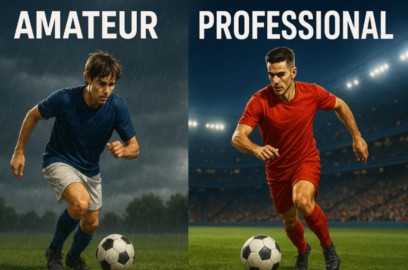
Do you dream of signing a professional contract? You train three times a week with your team and play league matches on weekends? That’s a good start, but if you want to become a professional footballer — you need to understand one thing: ordinary effort gives ordinary results. What separates professionals from amateurs is systematic work off the pitch, discipline, and treating every day as a step toward their goal.
TRAINING OUTSIDE THE CLUB IS A STANDARD, NOT A BONUS
Amateurs only train when their club schedules it. Professionals train also when no one is watching. Extra individual sessions (technique, speed, strength, weak foot) are part of their daily routine. Even 20 minutes daily adds up to huge progress after a month or a quarter.
Example? Lewandowski spent years improving headers and movement in the box — because he knew it was his weaker area.
You should also have a list of your weaknesses — and work on them regularly.
PROFESSIONALS PLAN, AMATEURS WING IT
A pro footballer has a clear weekly plan: when to rest, when to hit the gym, when to watch match analysis, when to do speed drills.
Amateurs start the week without a plan — and often end it without any real progress.
What can you do?
– Plan your training week every Sunday evening.
– Log your sessions and rate yourself: what went well, what to improve?
– Learn to analyze your own matches — even if it’s just phone footage.
PROFESSIONALS TRAIN EVEN WHEN THEY DON’T FEEL LIKE IT
This is when you build your advantage. Amateurs often skip training because “it’s raining,” “I’m not in the mood,” or “my friend can’t come.”
Professionals go out alone. Even if the session isn’t perfect — it gets done. That’s what makes the difference.
PROFESSIONALS TRAIN SMART, NOT JUST HARD
Amateurs often do everything at once: gym, running, freestyle — then they get injured. Professionals understand their bodies, the phases of the season, and how to prioritize.
Train with match performance in mind, not just to get tired.
Build your form in phases: strength – explosiveness – technique – tactics.
Recovery is also training, not a lazy day.
PROFESSIONALS LEARN, AMATEURS THINK THEY ALREADY KNOW ENOUGH
Top players keep learning every day: from coaches, analysts, video, books.
Amateurs often shut themselves off from feedback — especially if it’s critical.
Change that:
– Watch top-level matches thinking, “What can I learn here?”
– Ask your coaches questions.
– Look for mentors or players further along than you.
CONCLUSION
If you truly want to become a pro, you need to start training like one — long before anyone gives you a shot. Professionalism isn’t a contract. It’s a lifestyle that begins in your mind and shows up in your daily actions.
Ask yourself today: is what I’m doing every day enough for someone to believe I can play professionally?
If not — start doing things differently.
If yes — keep going and don’t stop.
Want your work to be seen?
Go to FootballTalentsTube.com and show yourself to people who can help you reach the next level.





